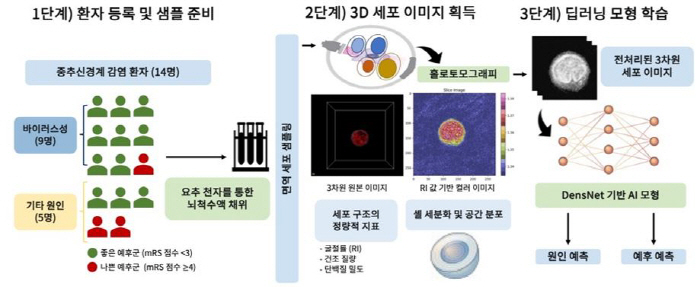Patients with Central Nervous System Infection Predict the Cause and Prediction of Infection with AI...Accuracy up to 99%
Jun 04, 2025
|
A research team led by Professor Park Yoo-rang, Professor Kim Kyung-min of the Department of Neurology at Yonsei University Medical School, and lecturer Choi Bo-kyu of the Department of Neurology at Gangnam Severance Hospital have developed a model that can predict the cause and prognosis of infection in central nervous system diseases by using images of the three-dimensional structure of immune cells in cerebrospinal fluid, and the prediction accuracy reaches up to 99% (cause prediction) and 94% (predictive prediction), respectively.
The results of the study, which was conducted with the support of Hyundai Motor's Chung Mong-koo Foundation health care R&D, were published in the international journal Advanced Intelligent Systems and selected as the cover of the June issue.
Acute inflammation of the central nervous system results in diseases such as encephalitis and meningitis. The causes of occurrence are very diverse, and symptoms and prognosis vary depending on the cause. Among them, if the cause is bacterial or tuberculous, the mortality rate is high and aftereffects such as cognitive impairment, cerebrovascular impairment, and repetition of convulsive seizures can occur after treatment, so rapid cause diagnosis and treatment are important.
The causes of inflammation vary, mainly due to infection by microorganisms, and confirmation tests differ for each pathogen, and specific tests take more than a few weeks to get results. In actual clinical practice, symptom-based empirical treatment is performed until results are obtained, which can lead to complications. Therefore, it is essential to accurately identify the cause in order to provide appropriate treatment to patients infected with the central nervous system.
The research team developed a model for predicting the cause and prognosis of infection in the central nervous system based on artificial intelligence and analyzed its effects.
We collected 3D images of a total of 1427 cerebrospinal fluid immune cells from 14 patients with CNS infection who visited Severance Hospital. Using the collected images of immune cell structure, a deep learning model was constructed to predict the cause and prognosis of infection.
The research team evaluated the cause and prognosis prediction performance of the central nervous system infection of the built deep learning model.
As a result, when one immune cell was substituted, the performance was 89% in the accuracy of predicting the cause of infection. The prognostic prediction accuracy of patients with neurological disease was 79%. In particular, the accuracy of each predictive performance increased as more cell images were substituted into deep learning models. When five immune cells were substituted, the accuracy of predicting the cause of infection reached 99% and the accuracy of predicting the prognosis reached 94%.
In addition, the research team confirmed that the deep learning model predicts the prognosis and cause by identifying differences in the structure around the cell nucleus, and uses quantitative indicators such as cell mass, volume, and protein density as important factors for prediction.
Professor Park Yoo-rang said, "This study is the first case of using three-dimensional images of immune cells in cerebrospinal fluid to predict the cause and prognosis of patients with central nervous system infection. We hope that the deep learning model presented in the study will help shorten the time required for patient diagnosis and prognosis prediction."
|
This article was translated by Naver AI translator.















